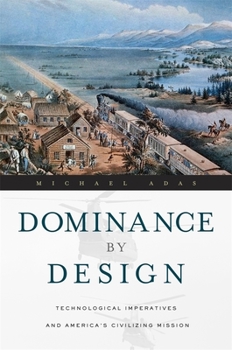Dominance by Design: Technological Imperatives and America's Civilizing Mission
Select Format
Select Condition 
Book Overview
Long before the United States became a major force in global affairs, Americans believed in their superiority over others due to their inventiveness, productivity, and economic and social well-being. U.S. expansionists assumed a mandate to "civilize" non-Western peoples by demanding submission to American technological prowess and design. As an integral part of America's national identity and sense of itself in the world, this civilizing mission provided the rationale to displace the Indians from much of our continent, to build an island empire in the Pacific and Caribbean, and to promote unilateral--at times military--interventionism throughout Asia. In our age of "smart bombs" and mobile warfare, technological aptitude remains preeminent in validating America's global mission. Michael Adas brilliantly pursues the history of this mission through America's foreign relations over nearly four centuries from North America to the Philippines, Vietnam, and the Persian Gulf. The belief that it is our right and destiny to remake foreign societies in our image has endured from the early decades of colonization to our current crusade to implant American-style democracy in the Muslim Middle East. Dominance by Design explores the critical ways in which technological superiority has undergirded the U.S.'s policies of unilateralism, preemption, and interventionism in foreign affairs and raised us from an impoverished frontier nation to a global power. Challenging the long-held assumptions and imperatives that sustain the civilizing mission, Adas gives us an essential guide to America's past and present role in the world as well as cautionary lessons for the future.
Format:Paperback
Language:English
ISBN:0674032160
ISBN13:9780674032163
Release Date:April 2009
Publisher:Belknap Press
Length:542 Pages
Weight:2.10 lbs.
Dimensions:1.5" x 5.0" x 7.7"
Customer Reviews
1 rating
Just not iconoclastic enough for my tastes.
Published by Thriftbooks.com User , 18 years ago
I found myself reading this book surprisingly quickly. It isn't ponderous or soaked with tendentious prose. The subject matter of the book, how America harnessed technology and technology mindfulness to shape and force through domestic and foreign policy initiatives, is tackled with encyclopaediac zeal. All in all the blend of history, politcs and science/technology makes for a potentially absorbing read, so why did I find it a bit deadening? It has all the right components and should have grabbed me by the ankles and swung me around but it didn't. Despite the technical qualities of the content, it contains two flaws. In the first instance it is repetitive. The first hint that this could be a problem is found in the first chapter discussing Admiral Perry's 'opening' mission to Japan. The reader is drilled into learning that Perry believed US technology would overawe the Japanese, etc. The vignettes are meant to illustrate the tehnological fascinations of US society and policy makers. The proposition is repeated on nearly every page of the chapter, and this tendency to drill home points persists throughout the book. Strangely, it did seem at times as if I had revisited a boyhood encyclopaedia. The book also steers clear of trenchant political analysis of the motivating investment forces of the various actors and their political agendas. This is a great pity as the material is more than ready for political mastication, irrespective of conservative or liberal preferences. If I was asked to sum up my main disappointment, it is the absence of iconoclasm. The chapters are crying out for a good old fashioned dollop of humbug from time to time. I 'got through' this book more under the traditional obligation to finish a book once one has started it than out of any deep sense of enjoyment. The scholarship is impressive. it may well suit professional historians in that genre more than a wider milieu. A book to contrast this one with is 'Irresistible Empire' which is a bit more worldly in my opinion and makes may of the same points, especially regarding Europe, with greater finesse.






